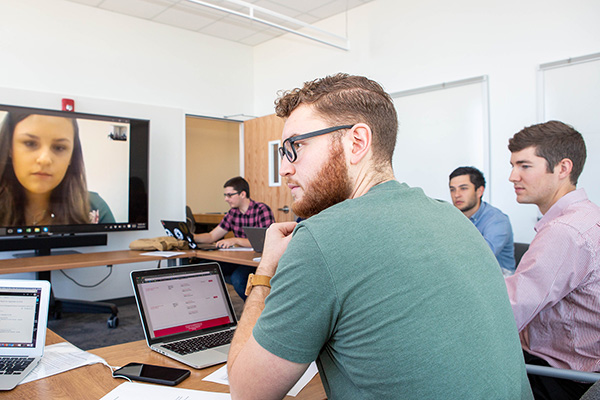Lab Resources
The following are some of the resources associated with the Anderson Behavioral Lab.
Lab Suite
 The Anderson Behavioral Laboratory (MCM 4010) is an approximately 1,500 square foot facility that consists of 5 rooms: lobby, two data collection rooms with computer workstations, a "boardroom" for focus group or social interaction research, and an experimenter control room.
The Anderson Behavioral Laboratory (MCM 4010) is an approximately 1,500 square foot facility that consists of 5 rooms: lobby, two data collection rooms with computer workstations, a "boardroom" for focus group or social interaction research, and an experimenter control room.
Research Rooms
Silver Suite: 10-12 seat room with audio and recording capabilities, 10 all-in-one Dell Computers, with wireless mice and headphones for each participant.
Cherry Suite: 10-12 seat room with audio and recording capabilities, 10 all-in-one Dell Computers, with wireless mice and headphones for each participant.
Boardroom: equipped with camera and microphone systems connected to Control Room's Computer for monitoring focus groups or teams research.
Hardware
All-in-One Desktop Computers (x20): Dell Optiplex 7760 all-in-one computers, 10 are available in each research room.
Headphones for each computer terminal (x20)
Laptops (x8): Dell Latitude 7400 laptops for mobile research deployment.
Locking portable laptop storage and charging cart (x1): Used to store Dell Laptops, can contain up to 10 laptops and chargers.
Empatica E4 Wristbands (x4): Only wearable on the market to combine EDA and PPG sensors, enabling the measurement of sympathetic nervous system and heart rate.
Tobii Pro Spectrum Eye Tracker (x1): Latest and most advanced eye tracking platform, designed from extensive studies into human behavior. This system can capture data in high sampling frequency, without hindering head movements.
Large flat LCD displays are mounted in each research room, boardroom and entrance of Laboratory (x4)
Software
Atlas.ti – Qualitative data analysis software
DirectRT: Software from Empirisoft that facilitates reaction time experiments.
E-Prime – Experiment delivery software from Psychology Software Tools
Internet-Based Data Collection: The lab holds a Qualtrics license and can facilitate data collection using this and other online data collection tools.
Linguistic Inquiry and Word Count – Text analysis software.
Max-QDA – Qualitative data analysis software.
MediaLab and DirectRT – Experiment delivery software from Empirisoft.
Microsoft Office (for all computers and laptops).
Noldus Face Reader: Fast, flexible, objective, accurate, and easy to use, with instant data analysis (of videos, live recordings and images); capable of audio recording.
Nvivo 12 PLUS – Qualitative data analysis software
Qualtrics: Web-based survey software for Anderson faculty and students. It is currently not available for those outside the college. Qualtrics combines exceptional ease of use with an advanced set of features.
SONA-Systems: The Lab holds a license for this software that manages research participation pools administration.
Tobii Pro Eye Tracker Manager: Supporting software that helps in calibrating and managing the connected eye-tracker and screens. Allows for an easy configuration whether the eye tracker is being used with its own screen or with a different computer. For Tobii Pro Spectrum, Eye Tracker Manager is used to update the firmware.
Tobii Pro Lab: Software the provides a visual user interface and features that can be utilized in the testing, recording and analysis of all phases of an eye tracking experiment. Tobii Pro Lab’s analysis and visualization tools allow researchers to efficiently and effectively process and prepare data for analysis and interpretation, as well as its presentation.
Z-Tree: Experiment delivery software for Behavioral Economics research.
Participant Pools
All UNM students age 18 or over are eligible to sign up for the Anderson Behavioral Lab Participant Pool. Students will receive Amazon gift cards for their participation, as well as gain a valuable learning opportunity. SONA Systems participant management software (web-based) is used to facilitate recruiting, participant sign up, and confirmation of participation.
Study Facilitation
The lab employs research and graduate assistants who have received humans subjects research training and are available to serve in a study facilitation capacity (i.e., as "experimenters").
